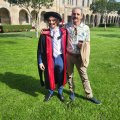In response to a world-shortage of graduates with the specific skills to solve complex biological problems in the biotechnology and pharmaceutical industries, The University of Queensland (UQ) has started offering a postgraduate degree in bioinformatics.
UQ’s Master of Bioinformatics will provide graduates specific training in the emerging discipline of bioinformatics, with a strong focus on statistical and computational analysis of genomes and proteins.
Students will have the opportunity to interact with high calibre researchers from across UQ, including staff from the School of Chemistry & Molecular Biosciences and The Institute for Molecular Bioscience.
Bioinformatician at UQ, Dr Mikael Bodén, says analysis of the human genome, for example, would not have been possible without bioinformatics.
“The biotechnology sector, the pharmaceutical industry and other scientifically-oriented companies are investing heavily in computational approaches and today major research organisations have dedicated bioinformatics divisions,” Dr Bodén said.
“Bioinformatics is a critical capability needed to support and drive modern genomics and molecular biology.”
Multiple potential employers of graduates, including the Australian Proteome Analysis Facility, the Queensland Facility for Advanced Bioinformatics and CSIRO, have applauded the development of this new program and have indicated a strong need for employees with a combination of molecular biology and computing skills.
“The life-science revolution is being driven by data of unprecedented volumes and complexity,” Dr Bodén said.
“Highly trained personnel are urgently required to manage, integrate and extract knowledge from these data.
“UQ’s Master of Bioinformatics emphasises practical skills, particularly extraction and analysis of data of vast volume and complexity.
“The program is designed to lead students to understand, develop and effectively use best bioinformatics practice to solve scientific problems, initially through classroom work and ultimately through immersion in a research laboratory.”
As part of this practical laboratory work, students will have the opportunity to work on projects to better understand cancer and diseases such as Friedreich ataxia and Huntington’s disease (both neurodegenerative disorders) by analysing and combining various kinds of biological data.
The program will appeal to graduates with degrees in biological science, IT or maths and is available for enrolment in 2012 onwards.
For program details, visit scmb.uq.edu.au/master.
Media enquiries: Rosalind Boulton, r.boulton@uq.edu.au, (07) 3365 4043, 0400 055 890
.jpg)


.png?itok=xWvYRDbm)







